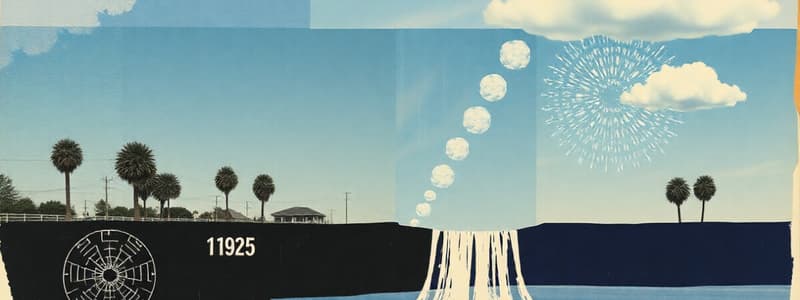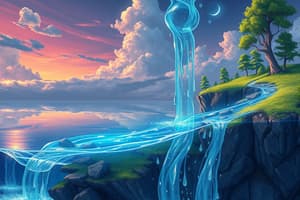Podcast
Questions and Answers
Which of the following best describes the water cycle?
Which of the following best describes the water cycle?
- A system where water remains static in oceans and rivers.
- A linear process where water is created and eventually lost from Earth.
- A process primarily driven by gravity, pulling water from land to oceans.
- A continuous movement of water on, above, and below the surface of the Earth. (correct)
What is the primary process by which water changes from a liquid state to a gaseous state in the water cycle?
What is the primary process by which water changes from a liquid state to a gaseous state in the water cycle?
- Transpiration
- Evaporation (correct)
- Precipitation
- Condensation
Besides oceans, which of these is a significant source of water evaporation?
Besides oceans, which of these is a significant source of water evaporation?
- Glaciers melting in polar regions
- Geothermal vents in the deep sea
- Transpiration from plant leaves (correct)
- Volcanic eruptions releasing lava
Which of the following forms of precipitation is NOT explicitly mentioned as returning water to the Earth in the provided content?
Which of the following forms of precipitation is NOT explicitly mentioned as returning water to the Earth in the provided content?
What is the term used to describe the movement of water through the ground within the water cycle?
What is the term used to describe the movement of water through the ground within the water cycle?
According to the content, what geological phenomenon contributes steam to the atmosphere, which ultimately feeds clouds?
According to the content, what geological phenomenon contributes steam to the atmosphere, which ultimately feeds clouds?
Besides water itself, what else is transported by the water cycle as described in the content?
Besides water itself, what else is transported by the water cycle as described in the content?
What is the primary source of energy that drives the entire water cycle?
What is the primary source of energy that drives the entire water cycle?
When water vapor rises and gains height in the atmosphere, what type of energy does its kinetic energy primarily convert into?
When water vapor rises and gains height in the atmosphere, what type of energy does its kinetic energy primarily convert into?
What is the process mentioned in the content that causes water vapor to rise upwards instead of moving in random directions?
What is the process mentioned in the content that causes water vapor to rise upwards instead of moving in random directions?
Flashcards
What is the water cycle?
What is the water cycle?
A continuous process by which water moves between the Earth's surface, atmosphere, and living organisms, involving evaporation, condensation, precipitation, and collection.
Evaporation
Evaporation
The transformation of liquid water into water vapor, driven by heat from the Sun. It primarily occurs in oceans, lakes, and rivers, but also in plants through transpiration.
Condensation
Condensation
The process where water vapor in the atmosphere cools and condenses, forming clouds. As more water vapor condenses, droplets become larger and heavier, leading to precipitation.
Precipitation
Precipitation
Signup and view all the flashcards
Collection
Collection
Signup and view all the flashcards
Transpiration
Transpiration
Signup and view all the flashcards
How does the water cycle transport matter?
How does the water cycle transport matter?
Signup and view all the flashcards
How does the water cycle transport energy?
How does the water cycle transport energy?
Signup and view all the flashcards
Convection
Convection
Signup and view all the flashcards
Study Notes
The Water Cycle
- The water cycle describes how water moves continuously around Earth. This includes oceans, rivers, the atmosphere, and land.
- Water continually circulates through different states (liquid, gas, solid).
- Water flows from mountains to streams, then rivers, and eventually to the sea.
- Seawater evaporates, creating water vapor that rises into the atmosphere.
- As the water vapor rises, it cools, condenses, and forms clouds.
- Clouds release water as rain or snow, which falls back to land and water bodies.
- Water also evaporates from rivers, lakes, and plants through a process called transpiration.
- Fog and dew are other forms of water returning to the Earth.
- Water can also move underground.
- Volcanic activity releases steam that can contribute to clouds.
Water Cycle and Energy
- The water cycle transports both matter and energy.
- The Sun's energy drives evaporation, giving water molecules kinetic energy to rise.
- This kinetic energy transforms to gravitational potential energy as water vapor ascends.
- Convection currents, driven by differences in air temperature (hot air rises, cool air sinks), are crucial in moving water vapor upwards.
- When water falls as rain or snow, potential energy is released as kinetic energy with the falling water.
Studying That Suits You
Use AI to generate personalized quizzes and flashcards to suit your learning preferences.




